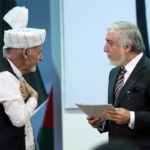The US peace envoy Zalmay Khalilzad on Twitter welcomed the Loya Jirga’s declaration and President Ghani’s decision to sign the decree ordering the release of the remaining prisoners.
Khalilzad also said that in “the next few days we expect the completion of prisoner releases, then travel of the Islamic Republic team to Doha, and from there the immediate start of intra-Afghan negotiations.”
“The United States seeks a sovereign, unified, and democratic Afghanistan that is at peace with itself and its neighbors and does not pose a threat to the world. Today, we are one step closer,” he said, adding: “As we have supported the Afghan people for the past 19 years, so do we now support Afghan men and women to achieve the sustainable peace for which they have long yearned.”
“The parties will embark on a process to reach an agreement on a political roadmap and a permanent and comprehensive ceasefire to end the Afghan war,” he said.
The Loya Jirga, the grand assembly with 3,400 delegates, in a resolution issued on Sunday approved the release of the 400 Taliban prisoners in an aim to quickly start the intra-Afghan talks and bring about a ceasefire and an end to the nation’s war.
The resolution, which has 25 articles, was issued on the last day of the Loya Jirga session. President Ashraf Ghani, former president Hamid Karzai and other political figures have called on the Taliban for an immediate start to the intra-Afghan talks.
The members of the Loya Jirga in the resolution welcome and support a llasting peace with dignity to bring stability to the country.
President Ashraf Ghani in Sunday’s closing speech to the Loya Jirga members said he would sign the decree to free the 400 remaining Taliban.
After the Loya Jirga resolution, Suhail Shaheen, a spokesman for the Taliban’s Qatar office in an interview with BBC Pashto said that the Taliban is ready to begin intra-Afghan negotiations within a week if the prisoner release is completed.
Shaheen said the first round of talks will be led by Abbas Stanikzai, the former chief negotiator of the Taliban during their talks with the United States.
According to government data, out of the 400 prisoners in question, 156 of them have been sentenced to death, 105 of them are accused of murder, 34 of them are accused of kidnapping that led to murder, 51 of them are accused of drug smuggling, 44 of them are on the blacklist of the Afghan government and its allies, 6 of them are accused of other crimes, 4 are accused of unspecified crimes.











